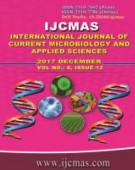


 National Academy of Agricultural Sciences (NAAS)
National Academy of Agricultural Sciences (NAAS)

|
PRINT ISSN : 2319-7692
Online ISSN : 2319-7706 Issues : 12 per year Publisher : Excellent Publishers Email : editorijcmas@gmail.com / submit@ijcmas.com Editor-in-chief: Dr.M.Prakash Index Copernicus ICV 2018: 95.39 NAAS RATING 2020: 5.38 |
Zinc is an essential micronutrient which plays a macro role in the growth and productivity of the plants. Generally Indian soils are low in Zn and as much as half of the country soils are categorized to be Zn deficient. Hence, zinc fertilizer is applied in the soil as zinc sulphate. However the major portions of applied zinc sulphate become unavailable to plant in the soil. There was six zinc solubilizing bacterial strains were isolated from rhizosphere of maize. The bacterial isolate ZSB SM-1 was found to be effective in solubilizing the insoluble zinc substances viz., zinc oxide, zinc carbonate and slowly soluble Zn-EDTA. The insoluble Zn substance was effectively solubilized at 0.1 per cent concentration, compared to 0.2 per cent concentration. The solubilization might be due to production of acids by the culture, since the pH of the broth has been shifted from 7.0-7.3 to 3.0-4.8 after 10 days of inoculation.
 |
 |
 |
 |
 |